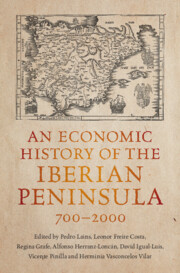Book contents
- An Economic History of the Iberian Peninsula, 700–2000
- An Economic History of the Iberian Peninsula, 700–2000
- Copyright page
- Contents
- Figures
- Tables
- Contributors
- Preface: By Way of Presentation
- Introduction
- Part I The Making of Iberia, 700–1500
- Part II Globalization and Enlightenment, 1500–1800
- 10 Patterns of Iberian Economic Growth in the Early Modern Period
- 11 Population of the Iberian Peninsula in the Early Modern Period: A Comparative and Regional Perspective
- 12 Institutions and Policy, 1500–1800
- 13 Early Modern Financial Development in the Iberian Peninsula
- 14 Science, Knowledge and Technology, 1500–1800
- 15 Living Standards, Inequality and Consumption, 1500–1800
- 16 Trade and the Colonial Economies, 1500–1828
- 17 The Economic History of Iberia in a Wider Context, 1500–1800
- Part III Industrialization and Catching Up, 1800–2000
- References
- Index
10 - Patterns of Iberian Economic Growth in the Early Modern Period
from Part II - Globalization and Enlightenment, 1500–1800
Published online by Cambridge University Press: 22 February 2024
- An Economic History of the Iberian Peninsula, 700–2000
- An Economic History of the Iberian Peninsula, 700–2000
- Copyright page
- Contents
- Figures
- Tables
- Contributors
- Preface: By Way of Presentation
- Introduction
- Part I The Making of Iberia, 700–1500
- Part II Globalization and Enlightenment, 1500–1800
- 10 Patterns of Iberian Economic Growth in the Early Modern Period
- 11 Population of the Iberian Peninsula in the Early Modern Period: A Comparative and Regional Perspective
- 12 Institutions and Policy, 1500–1800
- 13 Early Modern Financial Development in the Iberian Peninsula
- 14 Science, Knowledge and Technology, 1500–1800
- 15 Living Standards, Inequality and Consumption, 1500–1800
- 16 Trade and the Colonial Economies, 1500–1828
- 17 The Economic History of Iberia in a Wider Context, 1500–1800
- Part III Industrialization and Catching Up, 1800–2000
- References
- Index
Summary
Around 1500 Spain and Portugal were among the most affluent nations in the world, and had income levels that were similar to those of other Western European countries. Three hundred years later the Iberian economies had lost their economic supremacy and fell behind all the main European powers. When did the first two global empires in history lose their hegemony to become secondary actors? What were the foundations of the collapse that explains the divergence from north-western Europe? This chapter addresses these issues and describes what is now known about the long-term trends of Iberian economies between 1500 and 1800.
- Type
- Chapter
- Information
- An Economic History of the Iberian Peninsula, 700–2000 , pp. 251 - 277Publisher: Cambridge University PressPrint publication year: 2024

